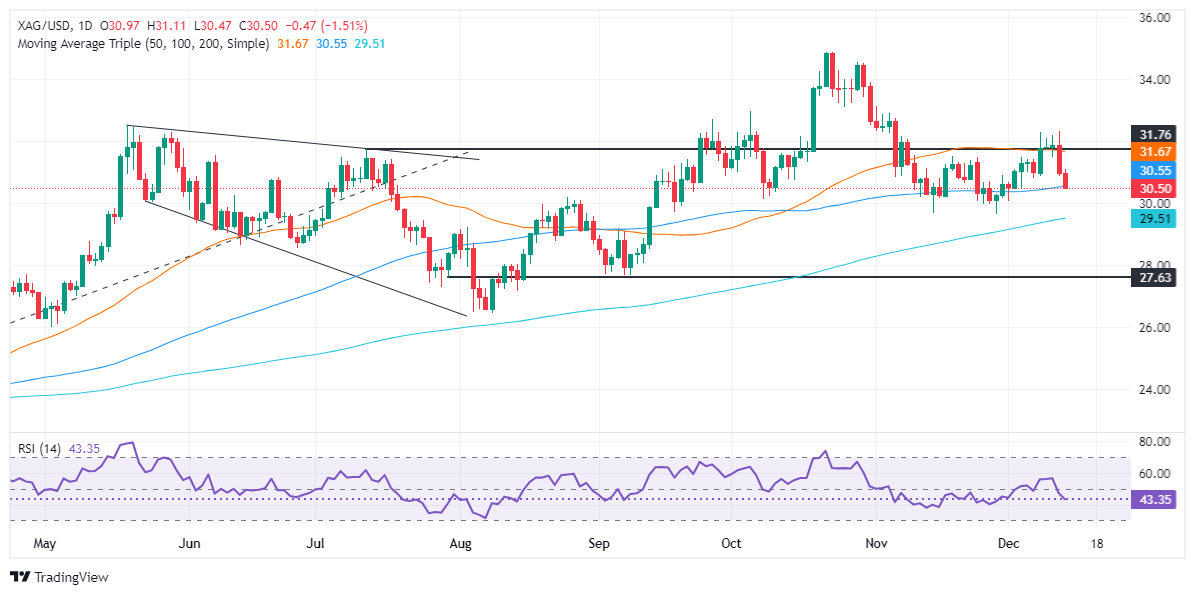Silver Price Forecast: XAG/USD retreats below $32.00 amid high US yields

- Silver struggles at $31.00, declines over 1% to test the 100-day SMA amid rising US bond yields.
- Technical outlook sees potential consolidation between the 100-day and 200-day SMAs, with key support at $29.49.
- Resistance levels ahead at $31.00 and $31.64, with potential upward movement towards $32.00 if regained.
Silver prices dropped on Friday after buyers could not hold prices above $31.00. Even though there are expectations that the US Federal Reserve will cut interest rates next week, US yields are rising, a headwind for the precious metals segment. The XAG/USD trades at $30.53, down more than 1%, testing the 100-day Simple Moving Average (SMA).
XAG/USD Price Forecast: Technical outlook
Next week’s events would provide a catalyst and define Silver’s path toward the end of the year. Despite this, the grey metal is set to finish with gains of over 30%, but in the short term, it could consolidate within the 100-day SMA and the 200-day SMA at $29.49.
If buyers push prices above $31.00, the next resistance level would be the 50-day SMA at $31.64. A breach of the latter will expose $32.00 before aiming for higher prices at $33.00.
Conversely, if sellers clear the 100-day SMA, the next support would be the $30.00 figure. Once hurdled, the next support would be the November 28 daily low of $29.64 before testing the 200-day SMA.
XAG/USD Price Chart – Daily
Silver FAQs
Silver is a precious metal highly traded among investors. It has been historically used as a store of value and a medium of exchange. Although less popular than Gold, traders may turn to Silver to diversify their investment portfolio, for its intrinsic value or as a potential hedge during high-inflation periods. Investors can buy physical Silver, in coins or in bars, or trade it through vehicles such as Exchange Traded Funds, which track its price on international markets.
Silver prices can move due to a wide range of factors. Geopolitical instability or fears of a deep recession can make Silver price escalate due to its safe-haven status, although to a lesser extent than Gold’s. As a yieldless asset, Silver tends to rise with lower interest rates. Its moves also depend on how the US Dollar (USD) behaves as the asset is priced in dollars (XAG/USD). A strong Dollar tends to keep the price of Silver at bay, whereas a weaker Dollar is likely to propel prices up. Other factors such as investment demand, mining supply – Silver is much more abundant than Gold – and recycling rates can also affect prices.
Silver is widely used in industry, particularly in sectors such as electronics or solar energy, as it has one of the highest electric conductivity of all metals – more than Copper and Gold. A surge in demand can increase prices, while a decline tends to lower them. Dynamics in the US, Chinese and Indian economies can also contribute to price swings: for the US and particularly China, their big industrial sectors use Silver in various processes; in India, consumers’ demand for the precious metal for jewellery also plays a key role in setting prices.
Silver prices tend to follow Gold’s moves. When Gold prices rise, Silver typically follows suit, as their status as safe-haven assets is similar. The Gold/Silver ratio, which shows the number of ounces of Silver needed to equal the value of one ounce of Gold, may help to determine the relative valuation between both metals. Some investors may consider a high ratio as an indicator that Silver is undervalued, or Gold is overvalued. On the contrary, a low ratio might suggest that Gold is undervalued relative to Silver.
